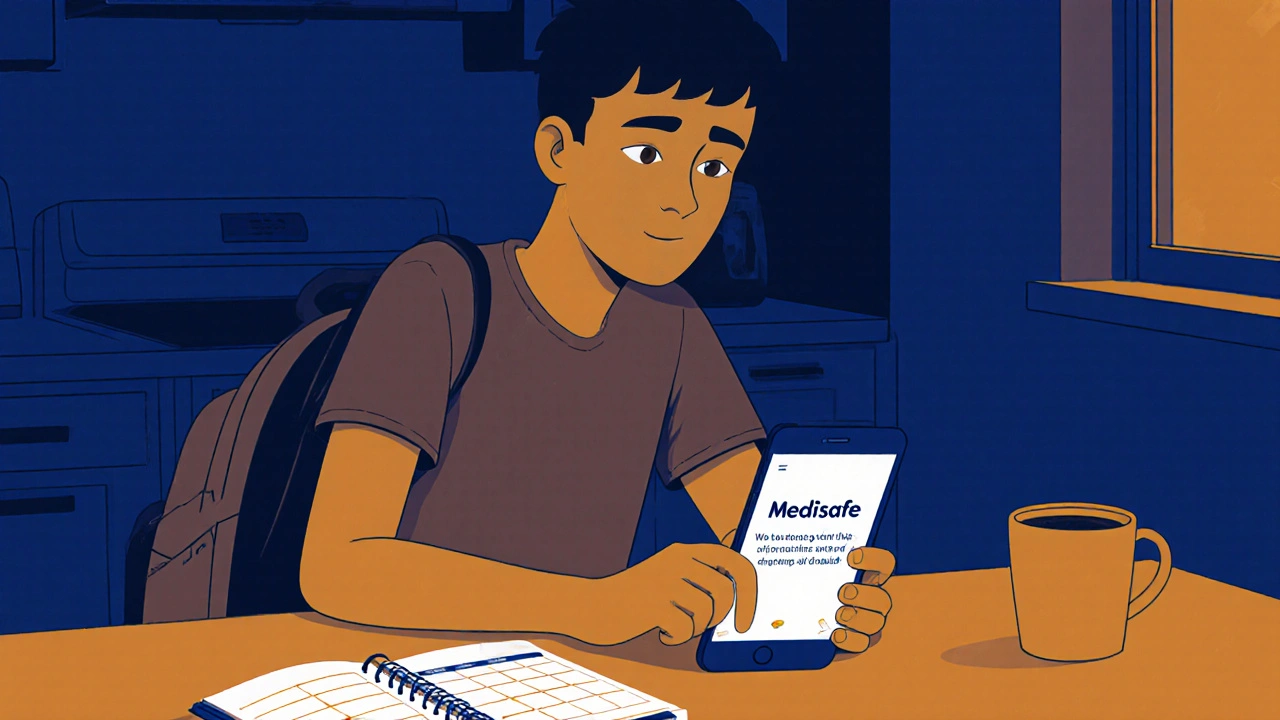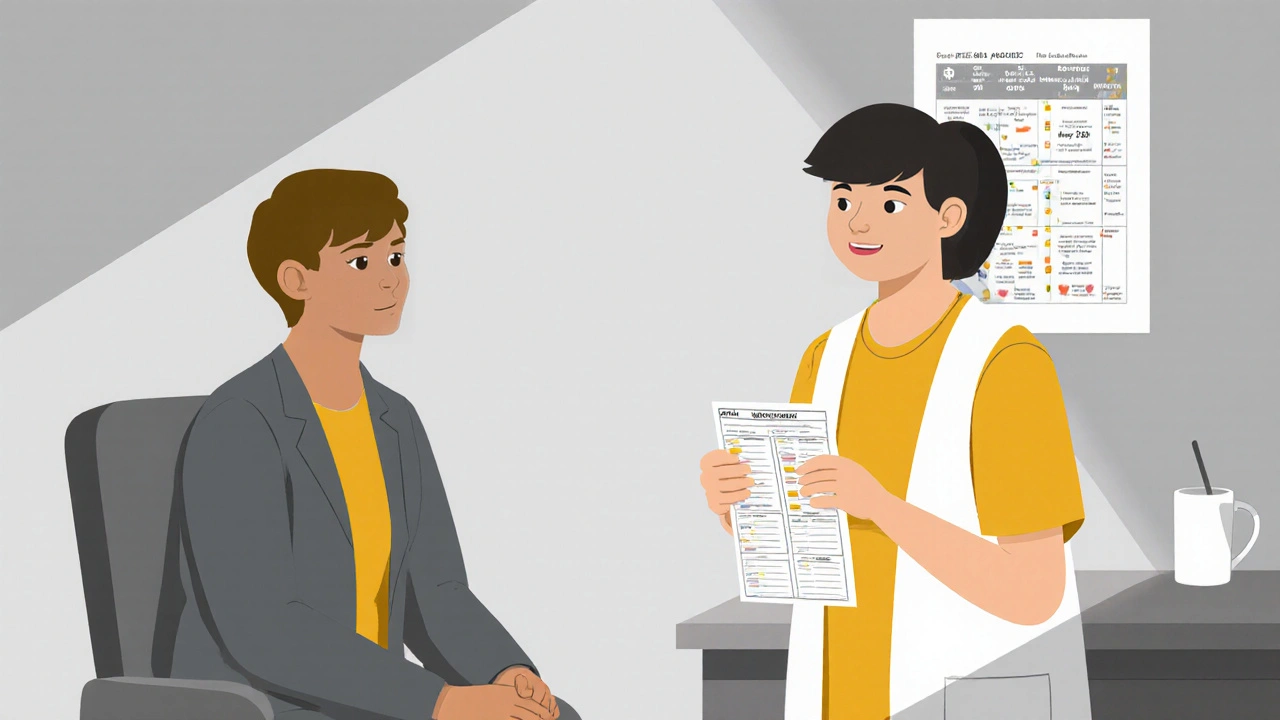Teens are on the verge of adulthood, and with that comes real responsibility-especially when it comes to managing their own prescriptions. Whether they’re taking medication for ADHD, asthma, anxiety, or chronic pain, learning how to handle meds correctly isn’t optional. It’s life-saving. Yet most parents wait until their child leaves for college to hand over control. By then, it’s often too late. The truth is, teens need practice-guided, supported, and gradual-long before they’re on their own.
Start Early, But Don’t Rush
Don’t wait until senior year. The best time to begin teaching medication management is in 10th grade. That’s when teens are developing the cognitive skills to understand cause and effect, remember routines, and take ownership. By 11th grade, they should be handling refills and scheduling doses. By 12th grade, they should be able to talk to their doctor, ask questions about side effects, and manage their entire regimen with minimal oversight.Start simple. Ask your teen: "What is this pill for?" and "When do you take it?" If they can’t answer clearly, it’s not because they’re being lazy-it’s because no one ever explained it in a way they understood. Use plain language. Avoid medical jargon. Say "this helps you focus," not "this is a central nervous system stimulant." Make sure they know why they’re taking it, not just that they’re told to.
Build a Routine That Sticks
Teens don’t respond well to lists or charts stuck on the fridge. What works? Linking meds to habits they already do every day. Brushing teeth? Taking a shower? Eating breakfast? Those are anchors.Research from the University of Rochester Medical Center shows that pairing medication with an existing daily habit increases adherence by 37%. So if your teen takes a pill after brushing their teeth every night, that becomes automatic. No reminders needed. No arguing. Just routine.
Set up a consistent time. Don’t let them skip a dose because they’re late for school or stayed up late. Consistency matters more than perfection. Even if they miss a dose, they should know what to do next-skip it or take it? Call the pharmacy? That’s part of the lesson.
Use Tools That Actually Work
Forget paper pillboxes from the 90s. Teens live on their phones. Use apps that meet them where they are.Apps like Medisafe and MyMeds send customizable alarms, track doses, and even notify a parent if a dose is missed. A 2020 University of Michigan study found that teens using smartphone reminders improved adherence by 41%. These apps aren’t just tech-they’re accountability tools.
But not all apps are created equal. The Mayo Clinic says only 22% of medication apps have been clinically tested for teens. Stick with ones recommended by doctors or pharmacies. Avoid gimmicks. Look for features like refill alerts, side effect logs, and the ability to share data with a parent or provider.
For teens on multiple daily doses, a weekly pill organizer with compartments for morning, afternoon, and night helps visualize what’s been taken. Fill it together on Sunday nights. Make it part of the ritual.
Teach Them About Risk-Not Just Rules
Most teens think prescription drugs are safer than street drugs. That’s dangerous. According to the DEA, 70% of teens believe prescription painkillers or ADHD meds are harmless if they’re prescribed. That’s a myth that can kill.Don’t just say "don’t share your meds." Explain why. Tell them: "Your Adderall might help you focus, but if someone else takes it, it could cause a heart attack." Or: "This opioid is for your broken wrist-not for partying. Taking more than prescribed can stop your breathing."
Use real data. The 2022 Monitoring the Future study found that 14% of high school seniors have misused prescription drugs. That’s one in seven. Talk about what happens when teens mix meds with alcohol, energy drinks, or sleep aids. Make it real. Not scary. Real.
Also teach them how to say no. The Generation Rx program’s curriculum gives teens scripts: "I’m not taking that. I have a prescription for a reason, and I’m not risking it." Role-play it. Practice it. Make it normal.

Let Them Talk to the Doctor
One of the biggest mistakes parents make? Talking for their teen at appointments. Don’t do it. Start inviting your teen to speak for themselves.In 11th grade, ask them to write down two questions before each visit. "Why am I still on this?" "What happens if I stop?" "Are there side effects I should watch for?"
Let them answer when the doctor asks, "How’s the medication working?" Don’t jump in. Let them struggle. Let them be awkward. That’s how they learn.
By senior year, they should be able to request refills, call the pharmacy with questions, and report side effects without your help. This isn’t about independence-it’s about safety. If they’re on opioids, stimulants, or benzodiazepines, they need to know how to recognize danger signs: dizziness, confusion, extreme sleepiness, or mood swings.
Keep Control of Controlled Substances
Even if your teen is responsible, don’t hand over the keys to the medicine cabinet. The American Academy of Pediatrics and Aetna both warn: controlled substances should always be locked up.Use a lockbox. Keep it in a place only you can access. Count pills monthly. If a prescription for 30 pills is down to 20 in two weeks, ask questions-not accusations. Say: "I noticed you’re running out faster. Is something off?"
Dispose of unused meds properly. Don’t flush them. Don’t toss them in the trash. Use a pharmacy take-back program. There are over 14,000 locations in the U.S. That’s not hard to find. The DEA says this is the #1 way to prevent diversion.
Check In-But Don’t Spy
The goal isn’t to catch them slipping. It’s to support them growing up.Start with daily check-ins via text: "Did you take your pill today?" Then move to every other day. Then weekly. Then monthly. By the time they leave for college, they should be managing everything-with you as a backup, not a boss.
Use a simple log. A notebook or app where they mark off doses. Review it together once a week. Celebrate streaks. Talk about slip-ups without shame. "What made it hard? How can we fix it?"
Studies in the Journal of Adolescent Health show teens with a "medication buddy"-a friend or sibling who also manages meds-have 22% higher adherence. Encourage them to find someone they trust to share the routine with.

What If They Mess Up?
They will. Maybe they forget. Maybe they skip a dose because they didn’t want to take it at lunch. Maybe they took an extra pill because they felt anxious.Don’t panic. Don’t punish. Don’t take back control immediately. Use it as a teaching moment.
Ask: "What happened?" "What could help next time?" "Do you need a different schedule? A different app? A different pill?"
Non-adherence isn’t rebellion. It’s often confusion, fear, side effects, or feeling different from others. Listen. Adjust. Try again.
Prepare for College
If they’re going to college, start planning six months before they leave.Make sure they have a 30-day supply of meds before they go. Know the pharmacy options on or near campus. Do they accept their insurance? Can they refill without a parent’s signature?
Teach them to carry meds in original bottles with labels. Never transfer pills to a different container. It’s illegal and dangerous.
Give them a printed list of all meds, doses, doctors, and pharmacy info. Keep a digital copy too. And remind them: if they feel sick, weird, or overwhelmed-call home. Or call the campus health center. They’re not alone.
It’s Not About Control. It’s About Trust.
Teaching teens to manage their own meds isn’t about handing over keys. It’s about building confidence. It’s about showing them they’re capable. It’s about preparing them for a world where they’ll be responsible for their own health-no matter what.They’ll make mistakes. You’ll worry. But if you’ve given them the tools, the knowledge, and the space to grow-they’ll get it right more often than not. And that’s worth every conversation, every alarm, every pillbox, and every check-in.
At what age should teens start managing their own medications?
Start introducing responsibility in 10th grade (around age 15-16). By 11th grade, they should handle refills and schedules. By 12th grade, they should manage everything independently, including talking to doctors. The goal is to have them fully capable before college.
What’s the best way to remind teens to take their meds?
Use smartphone apps like Medisafe or MyMeds with customizable alarms. Pairing doses with daily habits-like brushing teeth or eating breakfast-boosts adherence by 37%. Avoid relying on memory alone.
Should teens be allowed to keep their own prescription pills?
For non-controlled medications like asthma inhalers or allergy pills, yes. For opioids, ADHD stimulants, or benzodiazepines, keep them locked in a secure box. Only give access once they’ve proven consistent responsibility.
How do I know if my teen is misusing their prescription?
Watch for signs: running out of pills early, mood swings, secrecy about meds, missing doses followed by sudden overuse, or asking for refills too soon. Also, if they’re taking someone else’s meds or mixing them with alcohol or other substances, that’s a red flag. Talk to their doctor immediately.
What should I do with leftover or expired medications?
Never flush or throw them in the trash. Use a DEA-registered pharmacy take-back drop-off. There are over 14,000 locations in the U.S. This prevents misuse and environmental harm. Ask your pharmacist for the nearest site.
Can teens use their own health portal to manage meds?
Yes. The 2020 CURES Act allows teens aged 13 and older to access their own electronic health records, including medication lists. Encourage them to review their prescriptions, refill history, and doctor notes. It builds responsibility and transparency.
What if my teen refuses to take their medication?
Don’t force it. Ask why. Is it side effects? Embarrassment? Feeling better? Lack of understanding? Work with their doctor to adjust the plan. Sometimes switching to a once-daily pill or changing the timing helps. Never punish-guide.
Are medication apps safe for teens to use?
Only use apps that are clinically validated. As of 2023, only 22% of medication apps have been tested for teen use. Stick with those recommended by doctors or pharmacies. Avoid apps that don’t explain how they track data or protect privacy.
Teens don’t need perfect compliance. They need understanding, tools, and time. When you treat medication management as a skill to learn-not a chore to enforce-you’re not just helping them take pills. You’re helping them become capable, confident adults.

Comments (9)